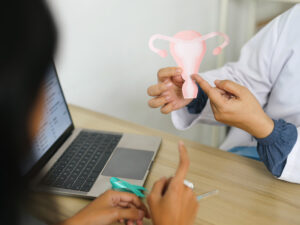
Infertility is a deeply personal and often misunderstood health issue that affects millions of women worldwide. While it’s common to hear about pregnancy success stories, conversations around the challenges of conceiving can be quietly suppressed. Even friends tend to avoid talk about signs of infertility. This can leave you isolated and filled with uncertainty.
But infertility doesn’t need to be taboo. Knowledge empowers you. Understanding the early symptoms and signs of infertility can be the first step toward infertile couples getting the support and treatment they need.
With that in mind, we’ve compiled answers to the infertility FAQs we hear in the clinics. So, keep reading if you wish to explore what infertility means, how it’s diagnosed, and why early awareness matters.
We’ll discuss the most common signs of infertility and potential causes, their emotional and psychological impacts, and the options available. Whether you’re trying to conceive now or planning for the future, here is the information you need.
Table of Contents
What Is Infertility, and When Should You Be Concerned?
What Causes Female Infertility?
What Are the Signs of Infertility in a Woman?
How is Infertility Diagnosed?
What Are the Treatment Options for Female Infertility?
What Is Infertility, and When Should You Be Concerned?
Infertility is often defined as the inability to conceive after 12 months of regular, unprotected sex (or 6 months for women over 35).
But beyond this medical definition lies a complex and emotional experience. So, it’s important to understand what infertility means, and how it differs from other reproductive challenges like sterility.
Unlike sterility, which refers to a complete inability to conceive often due to a medical condition or surgical procedure, infertility doesn’t necessarily mean pregnancy is impossible. It may just be taking longer than expected or require medical assistance.
So, there’s no need to fret, because many women with infertility eventually conceive with the right treatment or support.
Please talk to your doctor as soon as possible if you’ve been trying to conceive for over a year (or six months if you’re 35 or older) without success, They can then identify potential issues sooner and explore your treatment options. This will help you avoid the emotional toll of prolonged uncertainty.
But what are the possible root causes of female infertility? We’ll look at these causes first, and then in a moment look at possible signs of infertility you might notice.
What Causes Female Infertility?
Let’s now look at the most common causes of female infertility:
1. Ovulation Disorders
These are among the most common causes of infertility in women.
If you’re not ovulating regularly, or at all, it becomes difficult to conceive. Certain conditions can interfere with the hormonal balance needed to avoid ovulation disorders. These include polycystic ovary syndrome (PCOS), thyroid disorders, high prolactin levels, or even extreme stress or weight fluctuations.
So, it’s crucial to address these underlying conditions when you’re trying to conceive to increase your chances of regular ovulation.
2. Blocked Fallopian Tubes
Your fallopian tubes are essential for fertilization – your eggs travel this path to meet the sperm.
If your fallopian tubes have a blockage due to pelvic inflammatory disease (PID), previous infections, endometriosis, or past surgeries, your egg and the sperm may never meet. This makes conception impossible without medical intervention.
3. Endometriosis
Endometriosis is another common cause of infertility in women.
This condition occurs when tissue similar to the uterine lining grows outside the uterus – often on your ovaries, fallopian tubes, or other pelvic structures. This can cause scarring, inflammation, and pain. And it may also interfere with egg release, fertilization, or implantation.
Now, you may be asking yourself if all women with endometriosis are infertile. And, fortunately, the answer is no.
What percent of infertile women have endometriosis?
Among all women with endometriosis, 30–50% may experience difficulties getting pregnant. So, even if you were diagnosed with this condition, you still have the chance of getting pregnant with the right treatment.
4. Uterine or Cervical Abnormalities
Structural issues within the uterus, such as polyps, fibroids, or a septate uterus, can make it difficult for an embryo to implant and grow. In some cases, abnormalities in your cervical mucus or your cervix can also prevent sperm from traveling effectively.
5. Premature Ovarian Failure (Primary Ovarian Insufficiency)
This occurs when ovaries stop functioning normally before age 40. It can happen due to genetic conditions, autoimmune diseases, or sometimes for unknown reasons. Women with this condition may experience irregular periods and low estrogen levels, all of which can affect fertility.
What Are the Signs of Infertility in a Woman?
Infertility can sometimes be silent, but in many cases, your body offers subtle (or not-so-subtle) clues that something may be interfering with conception.
But why is early detection and awareness important? There are several reasons. One is that damage to your reproductive organs can get worse and may become untreatable. Another is that as you get older, your chances of conception (like those of most women) become less likely.
So – being aware of the following signs of infertility can help prompt you to get earlier medical evaluation and support so you conceive as soon as possible.
Here are some of the most common signs of infertility that you may experience:
Irregular Menstrual Cycle
Cycles that are consistently shorter than 21 days or longer than 35 days, or that vary significantly from month to month, can indicate ovulation issues. Ovulation is key to conception, and abnormal periods often signal that it’s not occurring regularly.
Do infertile women have periods?
Yes, many women who struggle with infertility continue to have a menstrual cycle. In fact, this can be one of the most confusing signs of infertility. You may feel like your body is working just fine because your period shows up each month, but something deeper could still be interfering with your ability to conceive.
In short, having periods doesn’t guarantee fertility, and missing periods doesn’t necessarily mean you’re infertile. That’s why fertility evaluations are so important, as they help uncover what’s happening beneath the surface.
Absent Periods (Amenorrhea)
Missing periods for several months (when not pregnant) could be a sign of underlying hormonal imbalances, stress, excessive exercise, or conditions like polycystic ovary syndrome (PCOS), all of which can affect fertility.
Painful or Heavy Periods
Menstrual pain is common, but severe cramping or unusually heavy bleeding in every menstrual cycle might be a sign of endometriosis or fibroids. These are both health conditions that can interfere with your ability to conceive.
Hormonal Imbalances
Symptoms like unexplained weight gain, thinning hair, excessive facial or body hair, or persistent acne may signal hormonal imbalances related to polycystic ovarian syndrome or thyroid dysfunction. Both can disrupt ovulation and fertility.
Pain During Intercourse
Sex should not be painful, so painful sex (dyspareunia) may be one of the warning signs of infertility: It could be linked to conditions like endometriosis or pelvic inflammatory disease (PID), which may affect fertility.
Recurrent Miscarriages
Experiencing two or more consecutive miscarriages may suggest an underlying fertility issue. Causes can range from genetic abnormalities and uterine conditions to immune or hormonal problems.
Underlying Medical Conditions
Autoimmune disorders, thyroid problems, diabetes, hormonal imbalances, and previous pelvic surgeries or infections can all play a role in fertility challenges.
No Pregnancy After a Year of Trying
As mentioned, quite often one of the biggest signs of infertility is simply the absence of conception despite regular, unprotected intercourse for 12 months (or 6 months if over age 35). This is the clinical threshold for seeking fertility evaluation.
Just to recap, here are the red flags you should not ignore:
- No period for several months
- Painful periods or severe PMS
- Multiple miscarriages
- Trying unsuccessfully for 6–12 months.
How is Infertility Diagnosed?
If you’ve been trying to get pregnant without success, it’s natural to feel confused, anxious, or even frustrated. But you have options.
So, if you experience any of the signs of infertility mentioned above, talk to your doctor immediately. They will help to diagnose infertility and guide you through the best treatment options.
After all, getting a clear infertility diagnosis is the first step to finding the right path forward!
So, here’s what you can expect from a thorough fertility evaluation and the diagnosis procedure:
Medical History and Physical Exam
Your healthcare provider will start by reviewing information about your menstrual cycle, past pregnancies (if any), any history of miscarriages or ectopic pregnancy, and general health. In addition, they may do a pelvic exam to check for signs of anatomical or hormonal abnormalities.
This is also your chance to ask questions or bring information you want to share.
So– prepare a list over a few months to take with you to your appointment and remember to include:
- A date log of your recent cycles to show their irregularity
- The dates on which you noticed symptoms such as severe PMS or a possible early miscarriage
- Any previous, relevant tests you have had, maybe elsewhere.
Blood Tests to Check Hormonal Levels
Your doctor will request a range of blood tests to evaluate reproductive hormones involved in ovulation and female fertility, including:
- Follicle stimulating hormone (FSH)
- Luteinizing hormone (LH)
- Estradiol (estrogen)
- Thyroid hormones
- Prolactin
- Anti-Müllerian hormone (AMH) – for ovarian reserve
These markers indicate whether your body is ovulating regularly and whether your egg supply is within a healthy range.
Ultrasound to Examine Ovaries and Uterus
A transvaginal ultrasound provides a closer look at your uterus and ovaries. It can detect issues like ovarian cysts, uterine fibroids, or a thin uterine lining. It’s also used to monitor follicle development during the ovulation cycle.
Hysterosalpingography (HSG)
An HSG is a specialized X-ray used to check whether your fallopian tubes are open and functioning properly. During the procedure, your healthcare provider will inject a contrast dye into your uterus and take images to see if the dye flows freely through the tubes.
Ovarian Reserve Testing
Your ovarian reserve refers to the number and quality of your remaining eggs, which naturally decrease as you get older. The AMH test – along with other hormone levels and ultrasound assessments (like antral follicle count) – helps evaluate your reproductive potential.
Laparoscopy for Detailed Pelvic Examination
If other tests don’t reveal the cause of infertility, or if there’s a suspicion of endometriosis, adhesions, or pelvic scarring, your doctor may recommend a laparoscopy. This is a minimally invasive surgical procedure that allows a close look inside the pelvis using a small camera.
Now, let’s get to what really matters: fertility treatments and how to increase your chances of getting pregnant.
What Are the Treatment Options for Female Infertility?
The good news is that many causes of infertility are treatable. And with the right support, you can likely conceive successfully.
The best fertility treatments, however, will depend on the underlying cause of your infertility, your age, your overall health, and how long you’ve been trying to get pregnant. Some of the most common and effective treatment options available include the following:
Ovulation-Stimulating Medications
If you don’t ovulate regularly, fertility medications can help stimulate ovulation. The most commonly used drugs include:
- Clomiphene citrate (Clomid)
- Letrozole (Femara)
- Gonadotropins (injectable hormones like FSH and LH)
These infertility treatments encourage your ovaries to produce and release eggs, increasing your chances of conception – either naturally or in combination with other treatments.
Intrauterine Insemination (IUI) and In Vitro Fertilization (IVF)
When simpler approaches don’t resolve signs of infertility and lead to pregnancy, your healthcare provider may recommend some of the following assisted reproductive technologies for your infertility treatment:
- IUI (Intrauterine Insemination): In this procedure, the doctor will wash and insert your partner’s sperm directly into your uterus during ovulation to increase the chance of fertilization.
- IVF (In Vitro Fertilization): IVF requires the retrieval of your eggs. In the procedure, a mature egg will be fertilized in a lab with sperm. The resulting embryo is then transferred into your uterus. IVF is often used for blocked tubes, advanced age, endometriosis, or unexplained infertility.
These methods can be powerful solutions, especially when combined with medical support. and lifestyle adjustments. Let’s look at both of those now.
Surgery to Correct Anatomical Issues
In some cases, surgical treatment may be necessary to improve fertility, especially if physical blockages or abnormalities are affecting your uterus, fallopian tubes, or ovaries. Common procedures include:
- Laparoscopy to remove endometriosis, scar tissue, or ovarian cysts.
- Hysteroscopy to correct uterine abnormalities like fibroids or polyps.
- Tubal surgery to repair blocked or damaged fallopian tubes.
Surgical treatment can restore normal anatomy, improve ovulation, and enhance your chances of natural conception.
Lifestyle Changes
In addition to medical treatments that can positively affect fertility, some simple lifestyle changes can also improve your fertility. Some strategies include:
- Maintaining a healthy weight: Both under- and overweight can disrupt your hormones and affect your menstrual cycle and therefore ovulation.
- Reducing alcohol, caffeine intake, and smoking: Caffeine can enhance the effects of alcohol, but alcohol itself can affect your hormones and ovulation. Smoking can damage your eggs – and quite possibly lead to complications like ectopic pregnancy or a miscarriage.
- Managing stress and sleep quality. Stress can affect your reproductive organs; e.g., influencing follicle size – while poor sleep quality leads to stress in a vicious circle!
- Avoiding anxiety and depression. As we mentioned, it’s natural to get frustrated and upset at failure to conceive, but it’s important to get support from close friends or professionals before your mood sinks low. Poor mental health can disrupt your HPG axis that regulates (again!) your reproductive hormones.
Infertility Signs and Symptoms: Stella Mattina Can Help
Infertility can be emotionally and physically overwhelming for infertile couples, but it’s not a dead-end street, and you’re not alone. We’ve shown you the likely causes, symptoms, and possibilities for helping you conceive via treatment or lifestyle changes.
The next step is to be proactive NOW and seek help without delay!
At Stella Mattina, we offer advanced fertility testing in Dallas. You can talk with a compassionate gynecologist/fertility specialist and take the first step toward infertility treatment and planned motherhood.
Don’t navigate infertility alone! Schedule your fertility consultation today and get the care you deserve.
Dr. Krum is currently in practice in Arlington, TX. He received his undergraduate degree at Texas A&M University, then attended UTMB Galveston for medical school, finishing in 1986, completing his residency there in 1990. Providing a full range of obstetrical and gynecological care, he specializes in the treatment of endometriosis and robotic surgery. He arranges his schedule so that same-day appointments are usually available.






